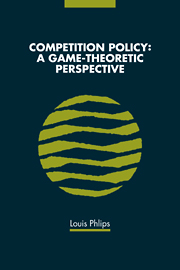Book contents
- Frontmatter
- Contents
- List of figures
- List of tables
- Preface
- 1 Preliminaries
- I Explicit collusion
- II Tacit collusion
- 5 Information sharing among oligopolists
- 6 Repeated games with collusive outcomes
- 7 Price leadership and conscious parallelism
- 8 Collusion detection
- III Semicollusion
- IV Predatory pricing
- References
- Index
5 - Information sharing among oligopolists
Published online by Cambridge University Press: 23 September 2009
- Frontmatter
- Contents
- List of figures
- List of tables
- Preface
- 1 Preliminaries
- I Explicit collusion
- II Tacit collusion
- 5 Information sharing among oligopolists
- 6 Repeated games with collusive outcomes
- 7 Price leadership and conscious parallelism
- 8 Collusion detection
- III Semicollusion
- IV Predatory pricing
- References
- Index
Summary
In the preceding chapter, the transmission of information appeared as an essential ingredient of cartel enforcement when the colluding firms have imperfect information about their current production rates or incomplete information about each other's cost of production. An efficient allocation of the production quotas implies side-payments. These in turn require truthful cost revelation since they depend on the cost reports. Efficient cartel agreements can be enforced with an appropriate combination of production quotas, side-payments and information transmission.
The next chapter is devoted to the enforcement of tacit collusion. It will be shown that collusive outcomes can be sustained as equilibria of a repeated game that is played non-cooperatively, that is, without explicit collusion and therefore without communication. The enforcement is based on credible threats of punishments imposed on a deviator. The detection of deviations and the carrying out of threats requires the passage of time: that is why firms must be supposed to meet over and over again in the marketplace. In chapter 7, collusive outcomes will be shown to result from announcements, by a leading firm, of price changes that are matched by the competitors. Finally, chapter 8 will draw attention to the informational disadvantage that makes it difficult, and often impossible, for antitrust authorities to detect tacit collusion and easy for tacitly colluding firms to untruthfully report demand or cost parameters such that collusive outcomes appear as competitive outcomes.
- Type
- Chapter
- Information
- Competition PolicyA Game-Theoretic Perspective, pp. 81 - 93Publisher: Cambridge University PressPrint publication year: 1995



